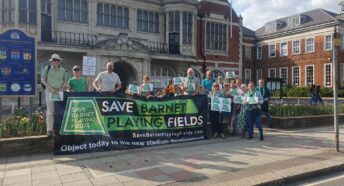How lockdown drove more people to the countryside... and produced more litter

It can’t come as a surprise to anyone who loves the countryside that one of the effects of the Covid-19 pandemic has been a shocking increase in litter.
More than a third of adults in England (38 per cent) have seen more litter near to where they live since the start of the pandemic and more than three-quarters (76 per cent) have noticed more Personal Protective Equipment (PPE) being littered, according to a YouGov poll commissioned by CPRE, the countryside charity.
Four in five people (78 per cent) would like to see the government take more action to tackle the scourge of litter. CPRE is therefore calling on the government not to delay and stick to its original timetable for a fully inclusive Deposit Return Scheme to reduce waste and litter and boost recycling.
CPRE has highlighted the poll’s three main findings:
• The pandemic has shone a light on our throwaway culture and England’s broken waste and litter system
• The government needs to do far more to tackle litter and support local authorities to create comprehensive refuse and recycling systems
• This includes tackling PPE littering by promoting the benefits of reusable masks where possible and encouraging people to dispose of any single-use masks responsibly
Commenting on the findings, Isla Lester, nine-year-old anti-litter advocate and CPRE Green Clean participant, said:
“I think more people should litter-pick and think before they act, so the world can be much cleaner, much faster. This could be tackled in two ways: educationally and practically.
“It would be good if environmental issues were part of school lessons. Children need to be shown what polluting our planet really does. We need to see it for ourselves by going outside – having trips to the sea to look at the impact that litter has on beaches and sea life, and then doing things like litter-picking.
“I think local businesses should also help by putting things in place to not add to waste in their areas but to get rid of it.
“I just want more people to follow me and make the world a better place. We need everybody to work as a team to make a difference.”
During the pandemic, litter rates have risen in many areas across England. Ever-present wrappers, cartons, bottles and cups have been joined by plastic gloves and facemasks, all building up in our countryside. Litter has been a major problem for decades, but lockdown has led to new types and unprecedented levels in different places.
This was reflected in the YouGov poll, which questioned almost 2,000 respondents (1,964) across England on their perceptions of changes in litter since March 2020:
• More than three-quarters (76 per cent) of respondents noticed more Personal Protective Equipment (PPE) litter since the start of lockdown, with almost half (48 per cent) noticing a lot more
• More than one in three people (38 per cent) noticed more litter near to where they lived since the start of lockdown, while a third (34 per cent) noticed about the same amount of litter
• A total of 39 per cent of respondents noticed more flytipping since the start of lockdown
• Just over three-quarters of the English public (78 per cent) agreed that the government should be taking more action to tackle litter, including a third (33 per cent) who strongly agreed government should be doing more
Crispin Truman, chief executive of CPRE, the countryside charity, said: “Litter is a completely avoidable blight that currently scars our countryside. As more people than ever before venture into their local green space or countryside next door, it’s crucial that the government redoubles efforts to tackle litter and stops it pilling up in our beautiful countryside.
“That’s why ministers must follow through on pledges to tackle the scourge of litter. By investing in whole-system solutions to address litter, including a fully inclusive Deposit Return Scheme, we can deal with the long-lasting problem once and for all.
“That means no more delays on a fully inclusive Deposit Return Scheme, which should be introduced by 2023 at the latest. Hugely successful in other European countries, these schemes are proven to help drive unprecedented recycling rates and ensure thousands of tonnes of litter don’t end up in the countryside.
“We need a waste system that is responsive to changes in behaviour. Our current system has been failing for a long time – the pandemic simply put a spotlight on the waste crisis and it’s high time ministers stepped in.”
Alongside the poll, CPRE has launched Litter in lockdown, a study looking at trends in litter and waste since the start of the Covid-19 outbreak. It was launched at an online event attended by environment minister Rebecca Pow MP; Cat Chapman, co-author of the Litter in Lockdown study; Feryal Clark MP, member of the Environmental Audit Committee; and Isla Lester.
On the back of a wave of public support, the government set out plans for how it would better deal with resources and waste in 2018. Over two years later, these plans continue to be delayed further following pressure from drinks manufacturers, among others. The poll reveals a delay would be against public opinion and there is a large appetite for government and business action. Three in five adults (60 per cent) agree that organisations that produce single-use items should do more to ensure they are disposed of in the right way.
The poll also revealed stark changes in where the public were spending their time in light of Covid-19-related regulations and the Litter in Lockdown study shows that where people go, litter follows. Findings included:
• One in three adults (34 per cent) reported spending more time in the countryside since the start of lockdown
• One in three adults (32 per cent) had spent more time in parks and this rose to 44 per cent for those with children under the age of four
• Three-quarters of the public (75 per cent) spent less time in inner-city high streets and 69 per cent spent less time in local high streets, showing a substantial shift in where people spent their time
Tuesday, December 22, 2020
- A number of important documents have yet to emerge. For example, a rigorous transport plan and a finalised air-quality assessment. The latter is critical given that allocations at Teynham will feed extra traffic into AQMAs.
- There seems to be no coherent plan for infrastructure delivery – a key component of the plan given the allocations being proposed near the already crowded Junction 7.
- There seems to have been little or no cooperation with neighbouring boroughs or even parish councils within Swale itself.
The removal of a second consultation might have been understandable if this final version of the plan were similar to that being talked about at the beginning of the consultation process. It is, however, radically different in the following ways:
- There has been a major shift in the balance of housing allocations, away from the west of the borough over to the east, especially around the historic town of Faversham. This is a move that raises many concerns.
- A new large allocation, with accompanying A2 bypass, has appeared around Teynham and Lynsted, to which we are objecting.
- Housing allocations in the AONB around Neames Forstal that were judged “unsuitable” by the council’s own officers have now appeared as part of the housing numbers.
- Most of the housing allocations being proposed are on greenfield sites, many of them on Grade 1 agricultural land – a point to which we are strongly objecting.
Concerns about the rush to submit the plan
The haste with which the plan is being prepared is especially worrying given the concentration of housing in Faversham. If the town is to take a large amount of new housing, it is imperative that the policies concerning the area are carefully worked out to preserve, as far as possible, the unique nature of the town. The rush to submit the plan is likely to prove detrimental.
As Swale does not have a five-year land housing supply, it is open to speculative development proposals, many of which would run counter to the ideas contained in the current plan. Some are already appearing. This is a common situation, and one that, doubtless, is a reason behind Swale’s haste.
Our overriding fear, however, is that this emphasis on haste is ultimately going to prove counterproductive. This is because it is our view that the plan, in its current form, is unlikely to pass independent examination. We are urging Swale to listen to and act upon the comments being made about the plan and to return the plan to the council with appropriate modifications before submitting it to the Secretary of State.
Essentially, this means treating the current consultation not as the final one but as the ‘lost’ second consultation.
The consultation ends on Friday 30 April and we strongly urge residents to make their opinions known if they have not already done so.
Further information








